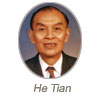AWARDEE OF ASTRONOMY PRIZE
XI ZEZONG
Abstract
Xi Zezong,a historian of astronomy, was born on June 6,1927 in Yuanqu,Shanxi Province. After graduation from Astronomy Department of Zhongshan University, he begin to work in Chinese Academy of Sciences till now. He has been a research professor and supervisor of doctor student since 1981 at the Institute for History of Natural Science of CAS and was the director of this Institute from 1983 to 1988. He is now president of Chinese Society of History of Science and Technology.He has been elected member of Chinese Academy of Sciences in 1991, of International Academy of History of Science in 1993, and of International Eurasian Academy of Sciences in 1995. He is also an academic advisor to the Research Center of Ancient Civilization, Chinese Academy of Social Sciences, and honorary professor of several universities.
The main contribution by professor Xi is his study of historical supernovae. He esstablished 7 criteria to identify novae form historial books and 2 criteria to distingish the novae and supernovae. he found 90 suspected novae from the historiacal books of China, Korea, and Japan, among which there were 12 probable supernovae. His papers “A new catalog of ancient novae”(1955) and “Ancient novae and supernovae recored in Chinese, Korean and Japanese annals and their significance to radio astronomy” (1965) has been reprinted by American “Science” and many other important journals, and cited by scholars over the world more than 1000 times.
In the 1970's he made a systematc research for the unearthed astronomical materials at Mawsngdui. Of them a chart illustrating 29 types of comets is the most valuable sources of date about the nature of comets from the period before the invention of the telescope. In 1981 he proposed that the Gallilean satellites of Juipter could bee seen without telescope and the Ganymede had ever been observed by Gan De in the waring States. His view draw a warm discussion and has been proved by obsevations.
As one of leading scientists of the state key scientific research project on the Xia-Shang-Zhou chronology beginnig in 1996, he takes charge of studying celestial phenomenon records during the period to define some absolute date for historial evants. “A chronological Table of the Xia-Shang-Zhou dynasties" is published in November 2000,in which astronomy plays an important role.






